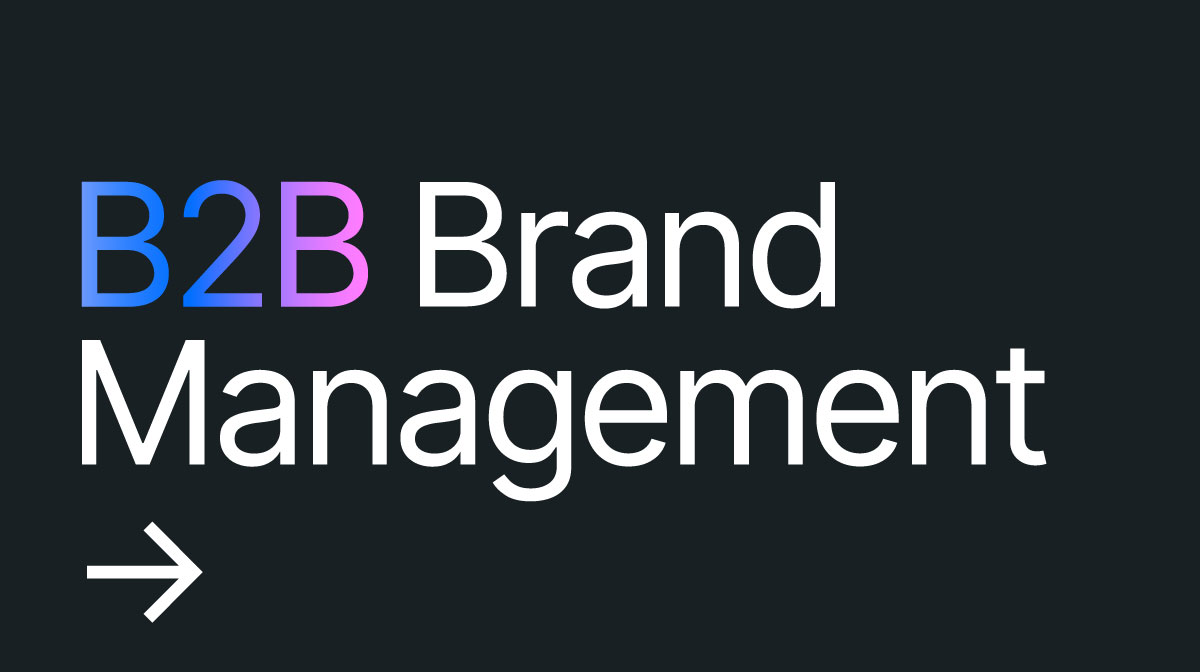
Brand management in B2B companies: striving for coherence and consistency
For B2B companies, maintaining brand consistency across all departments and communications can be a major challenge.
A wide range of touch points and the complexity of interactions with different audiences make brand management crucial to ensure a consistent image and messaging. Here, we explore two ways of managing a brand: internally, through a communication and branding department, and externally, by collaborating with specialised B2B agencies. We will look in detail at the advantages and disadvantages of each method and how they can help deal with the main problems B2B companies face in managing their brands.
BRANDING CHALLENGES IN B2B COMPANIES
B2B companies often face the following pain points in brand management:
- Inconsistency in communication: each department conveys messages in its own way, which confuses customers and weakens the brand.
- Misalignment of values: a lack of alignment between the corporate culture and the actions of departments can erode trust and credibility.
- Lack of visual and verbal cohesion: if marketing, sales and internal communications materials have different verbal and visual nuances, this can dilute brand identity.
- Challenges in adapting quickly: the inability to quickly adapt the brand strategy to changing market conditions can cause the company to lose relevance and presence.
INTERNAL BRAND MANAGEMENT
–Communication and branding department–
What it involves: An internal communication and branding department has a dedicated team responsible for developing, implementing and managing the company’s brand strategy. This team works closely with other departments to ensure that all of the company’s touch points consistently reflect the brand’s identity and values. This team features communication professionals, creatives, designers and copywriters.
Advantages:
- Total control: by having an in-house team, the company can have total control over how the brand is represented at all levels, ensuring consistency.
- In-depth knowledge: the in-house team has a thorough understanding of the company’s culture and values, making it easier to align communications with the corporate vision.
- Adaptability: internal teams can react quickly to changes in the market or in the company, adjusting strategies swiftly.
Disadvantages:
- High costs: maintaining an entire department can be costly in terms of the salaries, benefits and resources required.
- Lack of external perspective: internal teams may have limited insights, missing out on opportunities to incorporate fresh ideas and new perspectives.
- Limited resources: Depending on the size of the company, resources for research and strategy development may be limited.
EXTERNAL BRAND MANAGEMENT
– Collaboration with B2B brand agencies –
What it involves: Companies can collaborate with different types of specialised agencies to manage their brand. Some of the most common options are:
- Comprehensive marketing agencies: offering a full range of services including market research, strategy development, campaign execution and results analysis.
- B2B branding agencies: focusing on the creation and development of a brand identity specifically for B2B companies, including logos, slogans and brand positioning. They can also help invigorate a brand through performance branding.
- Digital agencies: specialising in digital strategies and campaigns, such as SEO, SEM and social media marketing.
Advantages:
- Specialised expertise: agencies have teams of experts in various areas of marketing and branding, providing a high level of specialisation and cutting-edge knowledge.
- Fresh perspective: External agencies can offer outward-facing and innovative insights, bringing new ideas and approaches that the in-house team might overlook.
- Flexibility: Companies can hire agencies for specific projects, without the need to maintain a full-time in-house team, offering greater flexibility in resource management.
Disadvantages:
- Cost: High-quality, specialised agency services can be expensive, which may be a barrier for some companies.
- Less control: Outsourcing brand management means giving away some control over strategies and execution, which can result in misalignments with the company’s vision.
- Integration times: External agencies need time to fully understand the company’s brand, culture and aims, which may lead to delays in strategy implementation.
For B2B companies, tackling the challenges posed by brand consistency is essential for maintaining a strong and consistent image in the market. The choice between managing the brand internally or externally depends on several factors, including the size of the company, the budget available and the brand’s specific needs.
A hybrid approach, combining an in-house team with the collaboration of external B2B branding agencies for certain projects, can offer the best of both worlds: control and in-depth knowledge of the company along with the specialisation and fresh perspective offered by agencies.
By working with a B2B branding agency, companies can benefit from more specialised and coherent brand management, ensuring that their image and messaging are consistent across all departments and communications. This not only strengthens brand identity, but also enhances customer perception and trust, which is crucial for long-term success in the competitive B2B landscape.